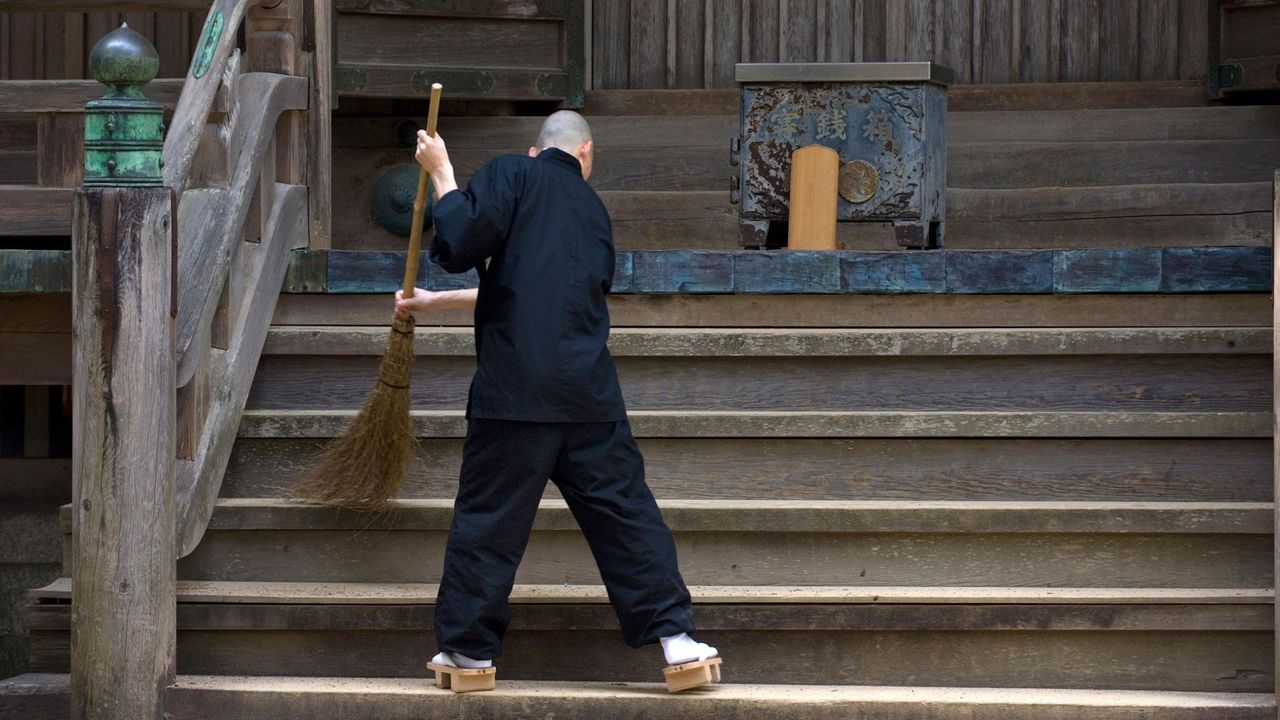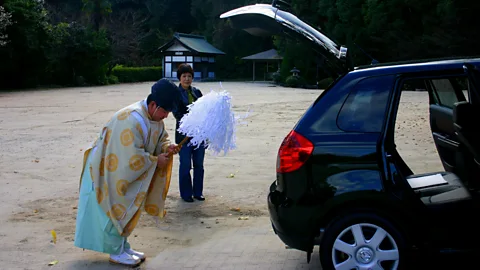
Japan's Secrets to Mastering Community Cleanliness
Quite possibly the earliest thing guest to Japan notice is the way perfect wherever is - yet there are not really any litter containers and road sweepers. What's the mysterious behind this logical inconsistency?
The understudies sit with their handbags on their work areas, anxious to return home following a lot of time seven 50-minute classes. They listen calmly as their instructor makes a couple of declarations about the upcoming schedule. Then, as each day, the instructor's last words: "Alright everyone, the present cleaning program. Lines one and two will clean the study hall. Lines three and four, the passage and steps. What's more, line five will clean the latrines."
A couple of moans emerge from line five, however the kids stand up, get the mops, materials and cans from the brush cabinet at the rear of the homeroom, and run off to the latrines. Comparable scenes are occurring at schools the nation over.

Most first-time guests to Japan are struck by how clean the nation is. Then they notice the shortfall of litter receptacles. Also, road sweepers. So they're left with the inquiry: how really does Japan remain so spotless?
The simple response is that inhabitants themselves keep it that way. "For quite some time of school life, from primary school to secondary school, cleaning time is essential for understudies' everyday timetable," said Maiko Awane, associate overseer of Hiroshima Prefectural Government's Tokyo office. "In our home life also, guardians instruct us that it's awful as far as we're concerned not to keep our things and our space clean."
Remembering this component of social cognizance for the school educational program assists the kids with fostering a consciousness of, and pride in, their environmental elements. Who needs to grimy or destroy a school that they need to tidy up themselves?
"I once in a while didn't have any desire to clean the school," reviewed independent interpreter Chika Hayashi, "yet I acknowledged it since it was essential for our daily schedule. I think cleaning the school is a generally excellent thing since we discover that we genuinely should get a sense of ownership with cleaning the things and spots that we use."

On showing up at school, understudies leave their shoes in storage spaces and change into coaches. At home, as well, individuals leave their road shoes at the entry. Indeed, even workers coming to your home will take off their shoes and cushion around in their socks. Furthermore, as the schoolchildren develop, their idea of what is their space stretches out past the study hall to incorporate their area, their city and their country.
A few instances of outrageous Japanese cleanliness have circulated around the web, similar to the seven-minute Shinkansen train-cleaning custom that has turned into a vacation spot by its own doing.
Indeed, even Japan's football allies are neatness cognizant. In World Cup football competitions in Brazil (2014) and Russia (2018), the public group's fans astonished the world by remaining behind to get trash from the arena. The players additionally left their changing area in flawless condition. "What a model for all groups!" tweeted FIFA's overall facilitator Priscilla Janssens.
"We Japanese are exceptionally delicate about our standing in others' eyes," Awane said. "We don't believe others should think we are terrible individuals who need more instruction or childhood to tidy things up."
Comparative scenes unfurl at Japanese live performances. At the Fuji Rock celebration, Japan's greatest and most seasoned celebration, fans keep their refuse with them until they track down a container. Smokers are told to bring a versatile ashtray and to 'shun smoking where your smoke can influence others', as indicated by the celebration site. How different to 1969's Woodstock celebration, where Jimi Hendrix played to a small bunch of individuals in the midst of a tremendous swamp of garbage.
Instances of social mindfulness have large amounts of day to day existence as well. Around 08:00, for example, office laborers and shop staff clean the roads around their work environment. Kids volunteer for the month to month local area clean, getting junk from the roads close to their school. Neighborhoods, as well, hold normal road cleaning occasions. Not that there's a lot to clean, since individuals bring their litter back home.

Indeed, even banknotes rise up out of ATM's pretty much as fresh and perfect as a newly treated shirt. In any case, cash gets messy, which is the reason you never put it straightforwardly into somebody's hand. In shops, lodgings and, surprisingly, in taxis, you'll see a little plate to put the cash. The other individual then, at that point, gets it.
Imperceptible soil - microbes and microscopic organisms - are one more wellspring of concern. At the point when individuals contract bugs or influenza, they wear careful veils to try not to contaminate others. This basic demonstration of thought for others lessens the spread of infections, subsequently saving a fortune in lost work days and clinical costs.
So how did the Japanese turn out to be so spotless cognizant?
It positively is definitely not another thing, as sailor Will Adams found when he moored here in 1600, consequently turning into the primary British chap to go to Japan. In his life story of Adams, Samurai William, Giles Milton noticed 'the honorability were conscientiously spotless', getting a charge out of 'unblemished sewers and toilets' and steam showers of scented wood when the roads of Britain 'frequently spilled over with dung'. The Japanese 'were horrified' by the Europeans' negligence for individual cleanliness.
To a limited extent, this distraction is brought into the world of functional worries. In a hot, damp climate like Japan's, food goes off rapidly. Microbes prosper. Bug life flourishes. So great cleanliness implies great wellbeing.
In any case, it goes further than that. cleanliness is a focal piece of Buddhism, which showed up from China and Korea between the sixth and eighth Hundreds of years. As a matter of fact, in the Harmony form of Buddhism, which came to Japan from China in the twelfth and thirteenth Hundreds of years, day to day undertakings like cleaning and cooking are viewed as profound activities, the same as thinking.
"In Harmony, all day to day existence exercises, including having feasts and cleaning the space, should be viewed as a chance to rehearse Buddhism. Washing off the soil both genuinely and profoundly assumes a significant part in the everyday practice," said Eriko Kuwagaki of Shinshoji Sanctuary in Fukuyama, Hiroshima Prefecture.
In Okakura Kakuro's The Book of Tea, his exemplary book about the tea service and the Harmony reasoning that mixes it, that's what he composes, in the room where the tea function is held "… everything is totally spotless. Not a molecule of residue will be tracked down in the most obscure corner, for in the event that any exists the host isn't a tea ace."
Okakura composed those words in 1906, however they actually turn out as expected today. Preceding a tea function at the Seifukan tea house in Hiroshima's Shukkeien Nursery, you'll see the tea expert's kimono-clad partner on all fours touching the tatami floor with a roll of tacky brown-paper tape, getting each spot of residue.
So for what reason aren't all Buddhist countries as fanatically perfect as Japan? Indeed, well before the appearance of Buddhism, Japan previously had its own native religion: Shinto (signifying 'The Method of The Divine beings'), said to revere the actual soul of the Japanese personality. Furthermore, neatness lies at the core of Shinto. In the West, we are instructed that cleanliness is close to faithfulness. In Shinto, neatness is purity. So Buddhism's accentuation on neatness just supported what the Japanese previously polished.
A critical idea in Shinto is kegare (pollutant or soil), something contrary to immaculateness. Instances of kegare range from death and infection to for all intents and purposes anything horrendous. Incessant purging customs are important to avoid kegare.
"On the off chance that an individual is distressed by kegare, it can carry mischief to society in general," made sense of Noriaki Ikeda, right hand Shinto cleric at Hiroshima's Kanda Sanctuary. "So rehearsing cleanliness is indispensable. This purges you and tries not to carry disasters to society. To that end Japan is an exceptionally spotless country."
This worry for others is justifiable on account of, say, irresistible sicknesses. In any case, it additionally deals with additional common levels, such as getting your own junk. As Awane put it: "We Japanese accept we shouldn't annoy others by being languid and disregarding the junk we've made."

Instances of custom refinement have large amounts of regular day to day existence. Prior to entering a Shinto sanctuary, admirers wash their hands and mouth in a stone water bowl at the entry. Numerous Japanese take their new vehicle to the sanctuary to be cleansed by the minister, who utilizes a plume duster-like wand called onusa that he waves around the vehicle. He then, at that point, opens the entryways, hood and boot to purge the inside. The cleric likewise filters individuals by waving the onusa from one side to another over them. He will try and utilize it to clean arrive on which new structure is going to initiate.
In the event that you live in Japan, you before long end up taking on the spotless way of life. You quit cleaning out your nose in broad daylight, utilize the hand sanitizers accommodated clients in shops and workplaces, and figure out how to sort your family waste into 10 distinct sorts to work with reusing.
What's more, similar to Will Adams and his castaway team back in 1600, you find your personal satisfaction moves along.
Then, at that point, when you return to your country, you're stunned by savages who sniffle and hack in front of you. Or then again step into your home in messy shoes. Unfathomable in Japan.
However, there's actually trust. All things considered, it likewise took some time for Pokémon, sushi and camera telephones to clear the world.
FAQs
What is the Japanese concept of cleanliness?
In Japanese Shintoism, virtue and cleaning ceremonies are directed much of the time, including the act of refining, or washing, one's hands, and mouth prior to entering a hallowed place. This means numerous other Shinto practices and the continuous evacuation of kegare (穢れ) or debasements.
How do the Japanese build the habit of cleanliness?

They get into the shower and wash themselves before they fall asleep. They even wash their bottoms utilizing shower latrines... These exercises are normal way of life customs for individuals in Japan. You could say that Japanese individuals put extraordinary significance on the demonstration of washing to keep their hands and bodies clean.
What does Shinto say about physical cleanliness?
Assertion of actual neatness: Cleanliness IS purity in Japan, subsequently the Japanese worry with scrubbing down, cleaning up frequently, washing out their mouths. One should be perfect within the sight of the spirits. Something not spotless is monstrous.
What is the Japanese cleaning mindset?
Cleaning is the Sanitization of our inward and external world. Cleaning is essentially as significant as doing contemplation and yoga to our spirit. Cleaning is associated with the energy of overflow, success, commendable, love, delight, euphoria. Cleaning is a holy errand.
Is cleanliness next to godliness Japan?
Japan's native religion, Shinto, likewise regards "neatness and immaculateness." The Onusa, an exceptional wand with crisscrossed white paper decorations for Shinto customs, has a shape like a plume duster. Shinto clerics utilize the Onusa by shaking it from one side to another at individuals to eliminate sins and pollutions from every individual.








